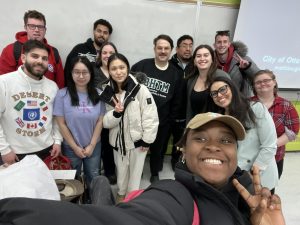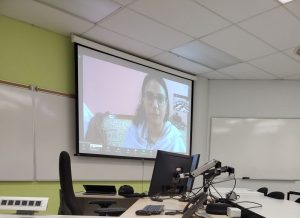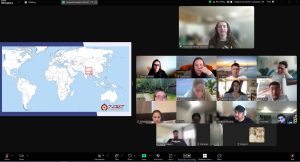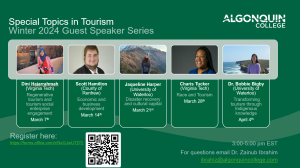Dr. Zainub Ibrahim’s Flexible Syllabus – Where the second half is TBD
Zainub Ibrahim
Flexible Syllabi as a Model for Faculty-Industry Co-Mentorship

One of the most effective ways to foster faculty-industry co-mentorship is through a flexible syllabus model, an approach that responds to real-time developments in the field while centering student interests and industry engagement in course design.
At Algonquin College, Dr. Zainub Ibrahim’s course TOU6121: Special Topics in Tourism exemplifies this approach. The course begins with a structured foundation, covering key themes such as the economic, environmental, and sociocultural impacts of tourism. The second half of the semester, however, is deliberately left open-ended.
This “TBD” structure invites students to co-create the curriculum each term, selecting topics based on current trends and their personal interests.

Each semester, students take part in a collaborative process to identify the issues they want to explore further, ranging from Indigenous tourism and nightlife policy to regenerative travel and tourism in post-crisis settings. Based on these interests, Dr. Ibrahim organizes a guest speaker series, drawing from her professional network and field experience. The result is a series that reflects the class’s priorities and is integrated into the heart of the course, not treated as an add-on.
A key enabler of this model is the hybrid classroom. In-person and virtual participation are equally supported, and Zoom makes it possible to invite guest speakers from anywhere in the world. This flexibility removes logistical and geographic barriers, giving students access to global perspectives. As a result, learners engage with tourism practitioners, researchers, and entrepreneurs working across diverse sectors and settings: from community-based projects in the Global South to policy innovation in Canadian cities.

Speakers have included graduate students (both master’s and PhD), alumni of the program, early-career professionals, and seasoned industry leaders. This diversity in backgrounds and experiences enriches the discussion and offers students practical insights into career options, graduate studies, and industry pathways. Students often reflect that hearing from people who are just a few steps ahead in their journey makes the learning feel both relatable and aspirational.
What if you can’t find enough guest speakers?
The flexible model is supported by a set of pre-developed lessons covering key contemporary topics. These ensure that the course remains robust even if speaker availability changes, while still reflecting the original spirit of responsiveness and relevance.
How is it assessed?
This guest-driven structure is not just for enrichment. It’s built into the course evaluation. Students complete short reflection assignments after each guest presentation, encouraging them to connect what they’ve heard to their own interests, experiences, and academic goals. These reflections promote deeper engagement and help students synthesize new ideas in meaningful ways.
To further support student learning, the themes from the speaker series are consolidated into a curated study guide for the final exam. Supplemental readings, case studies, and media are provided by both the professor and the guest speakers. This reinforces the value of the guest content and ensures students have a structured path to revisit and engage with the material beyond the live sessions.
Everyone learns.
This model fosters mutual learning. Students gain timely, real-world insights. Faculty stay connected to industry practice. And guest speakers often express how energizing it is to engage with thoughtful student questions and perspectives. These sessions become collaborative spaces where genuine co-mentorship emerges.
It is intentional.
Leaving space in the syllabus for this kind of flexibility is not an afterthought—it’s a deliberate design choice. It reflects a belief that students should play an active role in shaping what they learn, and that the classroom can serve as a live interface between academia and the world of work.
Ultimately, flexible syllabi are not just about adapting content—they embody a teaching philosophy grounded in dialogue, responsiveness, and relevance. When supported by hybrid tools and strong faculty-industry relationships, they transform the classroom into a dynamic, inclusive space where learning is co-created and community is built.

Media Attributions
- image1-1
- Guest Speaker Zooms in
- Virtual Guest Speaker
- Guest Speaker Line Up

